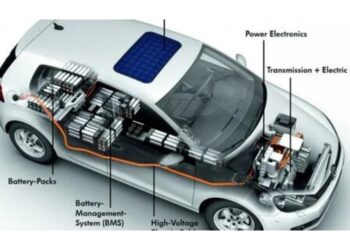Electric vehicles (EVs) are becoming an increasingly popular choice for environmentally conscious drivers and those looking to save on fuel costs. As these vehicles become more mainstream, one of the most frequently asked questions by potential EV owners is, “How much does it cost to replace an EV battery in 2025?” EV batteries are often viewed as a significant investment, but understanding the costs involved can help you make a well-informed decision when purchasing an electric vehicle.
In this article, we will explore the various factors influencing EV battery replacement costs, the average price range in 2025, and how you can plan for this future expense. We’ll also touch on how EV battery technology is evolving, potentially lowering costs in the near future. So let’s dive in and break down the facts!
Understanding EV Battery Costs: A Breakdown
EV batteries are at the heart of the vehicle’s powertrain. These large, high-capacity lithium-ion batteries store and deliver the energy necessary for driving. Given that the battery is one of the most expensive components in an EV, understanding the factors that influence replacement costs is crucial.
Key Factors Affecting the Cost of EV Battery Replacement
- Battery Type and Size
Different electric vehicles come with different types of batteries and battery capacities. Larger, more powerful batteries generally cost more to replace. For example, a Tesla Model S with a long-range battery will likely cost more to replace than a smaller, lower-range electric vehicle such as a Nissan Leaf. The more energy the battery can store, the more expensive it will be to replace. - Brand and Model of the Vehicle
EV battery prices can vary based on the brand and model of the vehicle. Premium EV brands like Tesla or Lucid Motors often have more expensive batteries compared to more budget-friendly options like Chevrolet Bolt or Kia Niro. This is due to the quality, design, and complexity of the batteries used in these vehicles. - Warranty and Service Plans
Most EV manufacturers provide warranties on the battery for a certain number of years or mileage. This can range anywhere from eight years or 100,000 miles to 150,000 miles, depending on the manufacturer. If your battery is still under warranty, you may not need to worry about replacement costs in the short term. However, if your battery is out of warranty, you’ll need to pay for replacement out-of-pocket. - Technology and Advancements
As battery technology continues to improve, the cost of replacement is expected to decrease over time. In 2025, we are likely to see a more competitive landscape with many manufacturers offering more affordable, longer-lasting batteries. - Labor and Installation Costs
Labor charges for replacing an EV battery can vary depending on the complexity of the replacement process. Some manufacturers have service centers that offer more affordable rates, while others may charge higher fees for labor and installation.
Average Costs to Replace an EV Battery in 2025
As of 2025, the cost of replacing an EV battery can range from $3,000 to $20,000, depending on several factors. Here’s a closer look at the typical costs for different types of electric vehicles:
- Compact EVs (Nissan Leaf, Chevrolet Bolt):
For compact EVs with smaller battery capacities, the cost of replacing the battery is generally in the range of $3,000 to $8,000. These are often vehicles with a driving range of 150 to 250 miles, and their battery sizes are typically between 30 kWh and 60 kWh. - Mid-Range EVs (Ford Mustang Mach-E, Hyundai Kona Electric):
For mid-range EVs, you can expect to pay between $8,000 and $12,000. These vehicles often have larger battery capacities (around 60 kWh to 80 kWh) and longer driving ranges (250 to 350 miles). - Luxury EVs (Tesla Model S, Lucid Air):
Premium EV models with high-performance batteries and ranges over 300 miles will typically cost more to replace. For high-end models like the Tesla Model S or Lucid Air, battery replacement costs can range from $12,000 to $20,000 or more, depending on the battery size (100 kWh to 130 kWh) and vehicle specifications.
While the sticker price for a replacement battery can seem daunting, it’s important to remember that EV batteries are designed to last a long time. Most EV batteries can last anywhere from 8 to 15 years, depending on usage and environmental conditions.
Is EV Battery Replacement Covered by Insurance?
Some EV owners may wonder whether their insurance will cover the cost of battery replacement. In most cases, traditional car insurance policies do not cover battery replacement unless specifically outlined in the policy. However, certain EV manufacturers offer extended service plans that may include battery replacement or coverage for a portion of the cost after the original warranty expires.
Can You Save Money on Battery Replacement?
There are several ways to mitigate the cost of replacing an EV battery:
- Battery Recycling Programs
Several manufacturers, including Tesla, are working on battery recycling programs that can lower the overall cost of replacement by reusing parts of old batteries. Recycling also benefits the environment by reducing the need for new raw materials. - Third-Party Battery Providers
In some cases, third-party companies may offer EV battery replacements at a lower cost than the vehicle manufacturer. However, it’s important to do your research to ensure the replacement battery meets the manufacturer’s specifications. - Upgrading to Newer Battery Technology
As newer battery technologies emerge, it may be possible to replace your old battery with a more efficient, longer-lasting model, which could provide better value over time. This could be particularly useful if your EV is several years old, and the replacement battery options have improved in terms of energy efficiency.
How EV Battery Technology Is Evolving
Battery technology is improving every year, leading to lower costs for consumers. Some of the most exciting advancements include:
- Solid-State Batteries
Solid-state batteries are a new, more energy-dense form of battery technology that promises to significantly lower the cost and increase the lifespan of EV batteries. These batteries are safer, more efficient, and could revolutionize the way we think about EVs. - Battery Leasing Options
Companies like Renault and Nissan have explored battery leasing models, where the battery is rented rather than purchased upfront. This reduces the cost of the vehicle, and the battery owner takes responsibility for maintenance and replacement.
Persistence Market Research: A Valuable Resource for EV Battery Insights
If you’re looking for detailed, up-to-date market insights on EV battery trends and pricing, Persistence Market Research (PMR) is an excellent resource. As a prominent market research firm, PMR offers in-depth analyses of the electric vehicle sector, covering aspects like battery technologies, cost forecasts, and shifts in the market landscape. Their data-driven reports are invaluable for consumers, manufacturers, and industry stakeholders, helping them navigate the factors influencing EV battery prices and future developments in the EV market.
Conclusion
Replacing an EV battery in 2025 is a significant cost to consider, but it’s important to look at the bigger picture. With advancements in battery technology, more affordable options, and longer-lasting warranties, the cost of replacement is expected to decrease in the future. Whether you drive a compact electric car or a high-end luxury model, understanding the factors influencing battery prices can help you plan ahead and make the most of your EV investment.
If you’re in the market for an electric vehicle or are currently driving one, it’s essential to keep these costs in mind and explore options like warranties, battery leasing, or third-party replacement services. Also, keep an eye on emerging technologies like solid-state batteries, which could drastically change the EV landscape in the coming years.
Want to learn more about EV battery technology and future trends? Check out Persistence Market Research for valuable insights and data on the evolving EV industry!













